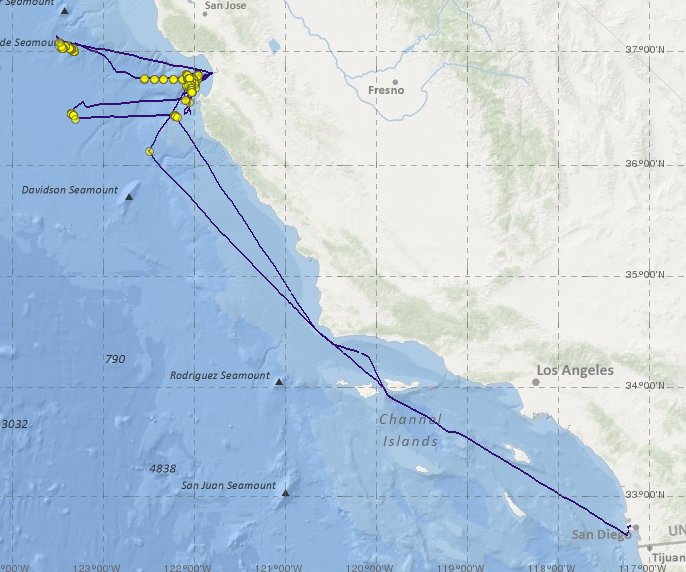SOLOPC unprocessed data from cruises NH1008, NH1307 in Monterey Bay, near MBARI buoy M1 (36.747?N, 122.022?W), Southern California Bight 33?N 118?W; 2010 and 2013 (GATEKEEPERS project)
Project
| Contributors | Affiliation | Role |
|---|---|---|
| Checkley, David M. | University of California-San Diego Scripps (UCSD-SIO) | Principal Investigator, Contact |
| Dagg, Michael | Louisiana Universities Marine Consortium (LUMCON) | Co-Principal Investigator |
| Jackson, George A. | Texas A&M University (TAMU) | Co-Principal Investigator |
| Gegg, Stephen R. | Woods Hole Oceanographic Institution (WHOI BCO-DMO) | BCO-DMO Data Manager |
SOLOPC - UnProcessed Data Files
Sensor specific binary (.BIN) data files were converted to unprocessed, ascii, text using SOLOPC system software.
The file names 'SOLOPC_NH{xxx}293#_GK#' the first number 2930 or 2931 refers to which SOLOPC cruise the data were collected on, which instrument was deployed and the GK# refers to each of the six deployments, 5 & 6 being combined. No "GK" id's for NH1307.
No further processing of these text files has been carried out.
tar.gz archives of the text files per deployment are served.
Collected during SOLOPC deployments
Note - These are tar.gz archives of unprocessed, ascii text files
| File |
|---|
SOLOPC_UnProcData.csv (Comma Separated Values (.csv), 2.29 KB) MD5:1fe62fc70679f05df96de648585c74eb Primary data file for dataset ID 3738 |
| Parameter | Description | Units |
| SOLOPC_Deployment | SOLOPC Deployment Id | text |
| Event | Event Number | Dimensionless |
| Station | Station Number/Id | Dimensionless |
| ISO_DateTime_Local_Deployed | Deployment Date/Time (PDT) ISO formatted | YYYY-MM-DDTHH:MM:SS.xx[+/-TZ] |
| Latitude_Deployed | Deployment Latitude (South is negative) | decimal degrees |
| Longitude_Deployed | Deployment Longitude (West is negative) | decimal degrees |
| ISO_DateTime_Local_Recovered | Recovery Date/Time (PDT) ISO formatted | YYYY-MM-DDTHH:MM:SS.xx[+/-TZ] |
| Latitude_Recovered | Recovery Latitude (South is negative) | decimal degrees |
| Longitude_Recovered | Recovery Longitude (West is negative) | decimal degrees |
| UnProcessed_Data_Archive | UnProcessed Data Archive (tar.gz files) | text |
| CruiseId | UNOLS Cruise Id | text |
| Dataset-specific Instrument Name | Laser Optical Plankton Counter |
| Generic Instrument Name | Laser Optical Plankton Counter |
| Dataset-specific Description | SOLOPC Specs (.pdf) |
| Generic Instrument Description | Laser Optical Plankton Counter (LOPC) |
NH1008
| Website | |
| Platform | R/V New Horizon |
| Report | |
| Start Date | 2010-07-08 |
| End Date | 2010-07-25 |
| Description | Collaborative Research: Zooplankton at the Base of the Particle Maximum: Gatekeepers of the Vertical Flux?: Deployment and recovery of SOLOPCs in Monterey Bay, plus CTD and MOCNESS deployments in Monterey Bay
Cruise information and original data are available from the NSF R2R data catalog.
Figure 1. R/V New Horizon Cruise NH1008 GATEKEEPERS
[click on the image to view a larger version] |
NH1307
| Website | |
| Platform | R/V New Horizon |
| Start Date | 2013-04-18 |
| End Date | 2013-04-18 |
| Description | Cruise information and original data are available from the NSF R2R data catalog. |
Zooplankton feeding at the base of the particle maximum: Gatekeepers of the Vertical Flux? (GATEKEEPERS)
Zooplankton feeding at the base of the particle maximum: Gatekeepers of the Vertical Flux?
A range of observations suggest that zooplankton act as gatekeepers for material leaving the euphotic zone. This study will investigate the interactions of zooplankton with other particles using a suite of autonomous and tethered instruments in conjunction with finescale water sampling. The SOLOPC (Sounding Oceanographic Observer with Laser Optical Plankton Counter) will be the autonomous instrument and provide hourly profiles of zooplankton and other particles. Previous sampling with the SOLOPC indicated a diel cycle of production and abundance of particles in the euphotic zone and their sinking and consumption, presumably by zooplankton observed at the base of the particle abundance maximum. The SOLOPC senses particles, including zooplankton and aggregates, and measures their equivalent spherical diameters which can be used to compute particle size spectra. However, it is difficult to use the SOLOPC to distinguish among particle types, such as copepods, larvaceans, and aggregates, particularly if they are small. The research will include an intensive field study that will take place in Monterey Bay and use adaptive sampling to observe near SOLOPCs with a new, AUV-borne imaging system, ship-based CTD and MOCNESS sampling, and MBARI's ROV Ventana. The investigators will alter a SOLOPC to be stationary relative to an isopycnal and use the particle counts that it accumulates to calculate a flux spectrum. They will combine the flux and concentration spectra to estimate particle sinking velocities as a function of particle diameter. Zooplankton feeding in the water column will be estimated by analyzing the gut fluorescence of animals caught in zooplankton nets and by counting the distribution of fecal pellets in water samples. Results will enhance the understanding of the role of the zooplankton as gatekeepers in the vertical flux of particles and, hence, the biological pump. The study will also provide new insight into factors that affect zooplankton behavior and ecology.
Collaborating institutions include SIO, TAMU, LUMCON, MBARI, BIO, and Université Paris VI. The SOLOPC, modified to measure flux as well as profile, and REFLICS are intended for acquisition and use by other researchers worldwide. The understanding we gain of role of the zooplankton as gatekeepers of the vertical flux will contribute valuably to understanding of the biological pump and the carbon cycle.
PUBLICATIONS PRODUCED AS A RESULT OF THIS RESEARCH
Jackson, GA and DM Checkley Jr. "Particle size distributions in the upper 100 m water column and their implications for animal feeding in the plankton," Deep-Sea Research, 2011.
Figure 1. R/V New Horizon Cruise NH1008 GATEKEEPERS
[click on the image to view a larger version]

| Funding Source | Award |
|---|---|
| NSF Division of Ocean Sciences (NSF OCE) | |
| NSF Division of Ocean Sciences (NSF OCE) | |
| NSF Division of Ocean Sciences (NSF OCE) |
[ table of contents | back to top ]